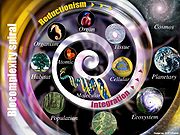
Biocomplexity
Encyclopedia

More recently (primarily as a result of funding policy changes at the American National Science Foundation
National Science Foundation
The National Science Foundation is a United States government agency that supports fundamental research and education in all the non-medical fields of science and engineering. Its medical counterpart is the National Institutes of Health...
around 2000), some researchers have begun to use the term biocomplexity in a narrower sense to denote the complex
Complexity
In general usage, complexity tends to be used to characterize something with many parts in intricate arrangement. The study of these complex linkages is the main goal of complex systems theory. In science there are at this time a number of approaches to characterizing complexity, many of which are...
behavioral, biological, social, chemical, and physical interaction
Interaction
Interaction is a kind of action that occurs as two or more objects have an effect upon one another. The idea of a two-way effect is essential in the concept of interaction, as opposed to a one-way causal effect...
s of living
Life
Life is a characteristic that distinguishes objects that have signaling and self-sustaining processes from those that do not, either because such functions have ceased , or else because they lack such functions and are classified as inanimate...
organism
Organism
In biology, an organism is any contiguous living system . In at least some form, all organisms are capable of response to stimuli, reproduction, growth and development, and maintenance of homoeostasis as a stable whole.An organism may either be unicellular or, as in the case of humans, comprise...
s with their environment
Natural environment
The natural environment encompasses all living and non-living things occurring naturally on Earth or some region thereof. It is an environment that encompasses the interaction of all living species....
. This subfield of biocomplexity is relatively new and encompasses other domains such as biodiversity
Biodiversity
Biodiversity is the degree of variation of life forms within a given ecosystem, biome, or an entire planet. Biodiversity is a measure of the health of ecosystems. Biodiversity is in part a function of climate. In terrestrial habitats, tropical regions are typically rich whereas polar regions...
and ecology
Ecology
Ecology is the scientific study of the relations that living organisms have with respect to each other and their natural environment. Variables of interest to ecologists include the composition, distribution, amount , number, and changing states of organisms within and among ecosystems...
.
The aim of biocomplexity research is to provide quantitative models of complex biological phenomena both to understand them in their own right and to interpret and guide quantiative biomedical experimentation.
Biocomplexity is also the name of a journal which was meant to be published by Kluwer. A disappointingly low number of submitted manuscripts resulted in the publisher cancelling the journal's launch issue. http://www.bio.vu.nl/grc2000/biocomplexity.html
See also
- Biological degeneracyDegeneracy (biology)Within biological systems, degeneracy refers to circumstances where structurally dissimilar components/modules/pathways can perform similar functions under certain conditions, but perform distinct functions in other conditions. Degeneracy is thus a relational property that requires comparing the...
- Complex systemsComplex systemsComplex systems present problems in mathematical modelling.The equations from which complex system models are developed generally derive from statistical physics, information theory and non-linear dynamics, and represent organized but unpredictable behaviors of systems of nature that are considered...
- Evolution of complexityEvolution of complexityThe evolution of biological complexity is an important outcome of the process of evolution. Evolution has produced some remarkably complex organisms - although the actual level of complexity is very hard to define or measure accurately in biology, with properties such as gene content, the number of...
- Gaia hypothesisGaia hypothesisThe Gaia hypothesis, also known as Gaia theory or Gaia principle, proposes that all organisms and their inorganic surroundings on Earth are closely integrated to form a single and self-regulating complex system, maintaining the conditions for life on the planet.The scientific investigation of the...
- System theory
- Systems biologySystems biologySystems biology is a term used to describe a number of trends in bioscience research, and a movement which draws on those trends. Proponents describe systems biology as a biology-based inter-disciplinary study field that focuses on complex interactions in biological systems, claiming that it uses...
External links
- http://thesaurus.nbii.gov/ - Biocomplexity Thesaurus
- http://knb.ecoinformatics.org/index.jsp - Knowledge Network for Biocomplexity (KNB)
- http://www.ocean.udel.edu/extreme2003/mission/biocomplexity/ - Just what is biocomplexity?
- http://www.biocomplexity.indiana.edu - Web site devoted to biocomplexity research
- http://www.nd.edu/~icsb - Web site devoted to biocomplexity research
- http://www.bio.vu.nl/grc2000/biocomplexity.html - Homepage on the journal Biocomplexity (publication cancelled) by its editor Hans V. Westerhoff

